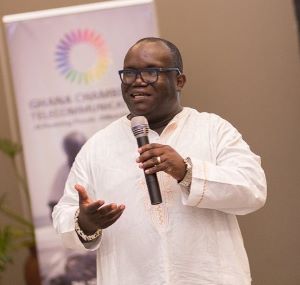Mr Ken Ashigbey, the Chief Executive Officer of the Ghana Chamber of Telecommunications, has said network operators in 2018 paid a total of GH¢1.94 billion tax and a direct capital expenditure of over GH¢276 million to the state.
He explained that the mobile industry contributed close to nine per cent of Ghana’s total revenue basket and employed more than 1.7 million people directly and indirectly.
Mobile Phone, he said, was a key channel for e-government’s strategy and financial inclusion drive, with public institutions now using mobile money, SMS, and USSD platforms to deliver services to the public.
Mr Ashigbey was speaking during the launch of “Mobile Report” by Jumia Ghana Limited in Accra to enlighten the public on the state of smartphone accessibility in Africa, particularly Ghana, and how it was contributing to socio-economic development.
He said since the inception of mobile phone usage in the country, 25 years ago, the industry had connected close to 70 per cent of the population, which amounted to over 20 million individuals and connected about half of the population to the internet through their mobile phones.
“With the government’s drive for digitisation and building smart citizens, leveraging mobile technology is key to the vision and requires collaboration by all stakeholders, including; development organisations, private sector players like; Jumia and the mobile industry itself,” he said.
The collaboration, he said, would create opportunities to extend mobile services to unconnected populations, empower women and reduce all forms of inequality amongst the citizenry.
“I will use this platform to reiterate that mobile is a powerful tool in enhancing people’s lives by enabling them to access personalised, value-added services”.
Speaking on the rampant sale of pre-registered sim cards to mobile phone users, Mr Ashigbey urged telecommunication companies to get a robust database to revalidate sim cards that had been registered to track agents who registered them with their identification cards and sold to customers.
Mr Ore Odusanya, the Managing Director of Jumia Ghana Limited, who delivered the report said, Jumia in 2018 sold 1.5 million smartphones in Africa as against 900 thousand in 2017.
According to the report, he said brands like Huawei and Samsung were reaching out to the underserved segment of the market and introducing affordable smartphones and other brands continued to introduce highly specked smartphones at high prices, which contributed to 60 per cent of the smartphones sold in Africa.
These brands, he said, were Infinix, Tecno and Hotwave, adding that, they were among the top five mobile brands on Jumia in 2018.
Mr Odusanya noted that the adoption of smartphones, came the purchase and use of data which implied a direct impact on growth in the sector.
He disclosed that mobile broadband coverage in Ghana in 2018 was 80.33 per cent and Jumia would launch its “Mobile Week” from April 8 to 14, 2019 to enable members of the public purchase smart phones at discounted prices.
The brands that would participate in the Mobile Week include; Samsung, Tecno, Infinix, Huawei, and Apple.
Source: GNA







